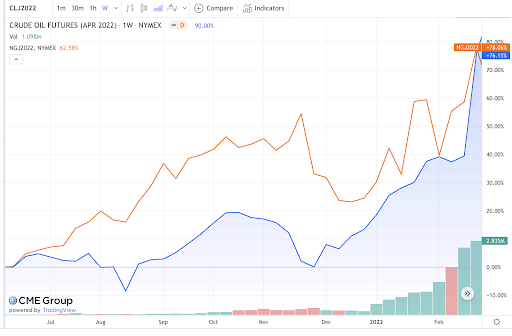Mar 15, 2022
The Ukraine War Will Raise Both Gas and Electricity Prices. The Solution is Not Fast Fossil Fuels but Fast Solar.

Everybody’s talking about how a shortage in world oil supplies connected with the war in Ukraine has caused gasoline prices to spike. But much less attention has been paid to the effect of oil shortages on the prices of electricity, which will also rise since much of America’s power is generated by fossil fuels.
Oil and gas lobbyists and PR flacks have taken the opportunity to call for more drilling to start immediately, especially inside the United States.
Faced with unrelenting media coverage about “pain at the pump,” in an effort to quickly bring down oil prices, President Biden has promised to replace embargoed Russian oil with supplies from other nations including Venezuela and to tap emergency supplies of oil in the U.S.
“Releasing oil from our Strategic Petroleum Reserves may seem necessary in the short term, but it simply perpetuates our vulnerability to oil wars,” writes Secure Futures’s founder and President Tony Smith in a guest column published today in the Virginia Mercury. “Solar represents the fastest path to reducing our dependence on war oil.”
How Clean Electricity Can Replace Dirty Oil
The media has focused on the effect of higher oil prices on drivers. And since most cars and trucks still run on gasoline or diesel fuel, crude oil price spikes hit drivers first. As more of America’s vehicles transition to electric power in the coming years, our dependence on fossil fuels for transportation will decrease. Meantime, just to get around, it’s clear that we need a certain amount of oil in the short term.
But there’s been little coverage in the media of the other major use for fossil fuels to provide energy, which is burning them to generate electricity.
Despite rapid growth in renewables in recent years, burning natural gas remains the biggest single way that utilities generate electric power in the United States. Gas generates 61% of electric power in Virginia with a similarly high proportion in other states. Therefore, increases in natural gas prices that accompany high prices for crude oil on world markets will lead to higher electric bills for homes and businesses as utilities pass along increased fuel costs to ratepayers.

Smith, a former oil trader who made his own transition into solar power more than a decade ago, explains how vulnerable America’s electric grid is to price increases for natural gas.
“The current surge in oil and natural gas prices recalls the spikes in the 1970s, caused by hostilities in the Middle East. Since Russian President Vladimir Putin first ordered a massing of military forces on the Ukraine border in March and April 2021, crude oil prices have risen by 122 percent, tracked by prices for natural gas (84 percent).”

What’s the best way to try to bring costs down? It’s not by quickly sourcing more oil and gas but instead by rapidly deploying more solar power, Smith explains.
“Rooftop solar, that can be installed in a matter of weeks, can offset the spikes of the oil war economies. We don’t need to wait years to build a ‘clean’ nuclear or natural gas power plant. If our national priority is to fast-track our path to energy independence, solar, especially when coupled with energy efficiency and energy storage technologies, represents the fastest and lowest cost solution,” writes Smith.
That’s because solar photovoltaic power “is now the cheapest source of electricity in history,” according to the International Energy Agency’s 2020 World Energy Outlook.
Smith calls for action by federal and state governments to help the private sector to start installing new solar generating capacity as quickly as possible:
- Congress should restore and maintain the investment tax credit for solar to 30 percent for a 10-year period.
- The U.S. Treasury should support small business by allowing for grants in lieu of tax credits as proved so effective from 2009 to 2011 in stimulating private sector investment in solar during the Great Recession.
- Through revenue “decoupling” legislation, more than a dozen states already incentivize their electric utilities to stop resisting, and start encouraging, distributed solar and energy efficiency, which are crucial to create a clean power grid. Virginia and other states that haven’t yet decoupled utilities’ revenues from their sales of electricity should pass decoupling legislation.
- Virginia should accelerate the schedule for achieving the clean energy goals of the Renewable Portfolio Standard established by the Virginia Clean Economy Act of 2020 to incentivize our investor-owned utilities to shift more of their generation assets to rooftop solar.
Resisting calls to drill and buy more oil from unstable foreign governments will require elected leaders to keep cool heads amidst widespread concern about high energy prices. Fortunately, solar offers an alternative to oil and gas that’s both cleaner but, given advances in the industry, also relatively quick to implement.
In today’s developing energy crisis, it’s no longer necessary to choose between energy that’s quick and energy that’s clean. Now, the cleanest source of power is also the quickest to ramp up.
And the side benefits of going solar, including creating jobs and giving a boost to local economies while developing a domestic source of energy free of control by foreign dictators and warmongers, make solar power that much more appealing than fossil fuels.
“Let’s put business as usual aside to reduce our dependence on war oil and transition nimbly to a more resilient renewable economy,” concludes Smith.
Read Tony’s full article at the Virginia Mercury:
“We Can Unhook from Oil and Gas Wars with Solar.”